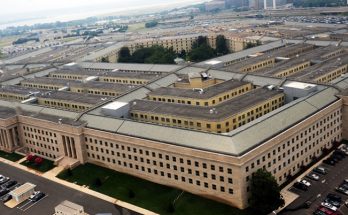Finland’s top leaders, President Sauli Niinisto and Prime Minister Sanna Marin, announced on May 12 that they favor their country applying for NATO membership.
The joint statement said, “As a member of NATO, Finland would strengthen the entire defense alliance. Finland must apply for NATO membership without delay. We hope that the steps at a national level that are still needed to make this decision possible will be taken rapidly over the coming days.”
Joint statement by the President of the Republic and Prime Minister of Finland on Finland's NATO membership:https://t.co/0xJ9OE70Cw@TPKanslia I @niinisto I @MarinSanna pic.twitter.com/ZviOgZ6v1n
— Finnish Government (@FinGovernment) May 12, 2022
The public statement echoes the opinion of the Finnish national parliament’s Defense Committee, which has already declared its desire for NATO membership. It also has the support of the main political parties represented in the legislature, a key point as 10 separate parliamentary committees are set to submit their assessments on the subject to the government’s Foreign Affairs Committee by May 15.
In essence, the most crucial opinions are aligning in favor of Finland applying for NATO membership, which should lead to a hastened process.
The handwriting has increasingly been on the wall regarding the tilt toward NATO membership since Russia launched its invasion of Ukraine earlier this year on February 24. Until that point, the idea of Finnish membership in NATO was more a talking point for foreign policy analysts than a realistic measure.
The announcement by the president and prime minister on May 12 marks a decided shift in Finland’s stance on military partnerships. Despite having joined the European Union in 1995 (thereby forgoing its traditional neutrality), the nation maintained an avowed military policy of nonalignment.
While being a Western-oriented democracy, during the Cold War Finland maintained a neutral stance due to pressure from the Soviet Union. During much of this period, Finland avoided invasion and potential annexation by the Soviets through the skilled “yes, but” diplomacy of President Urho Kekkonen (his time in office lasted from 1956-1982).
Kekkonen skillfully kept Finland from being gobbled up by agreeing to many Russian demands on lesser issues, such as where to import military equipment, but standing firm on the major issues in order to display his country’s independence.
Probably no foreign security policy debate in Finland has traditionally been more divisive than the country’s relationship with NATO. Part of the wariness surrounding NATO membership stemmed from pro-Soviet (or anti-U.S.) attitudes, while others related to the long 1,309-kilometer (813-mile) shared border with Russia and memories of the 1939-1940 “Winter War” with the Soviet Union.
But tremors along Russia’s former Eastern European Soviet sphere upset the normal indifferent or negative outlook regarding the trans-Atlantic alliance.
Despite generally healthy relations with Russia, events such as the cyberattacks on Estonian government servers in 2007, the invasion of Georgia in 2008, and the takeover of the Crimean Peninsula in 2014, followed by support of ethnic Russian separatists in the Ukrainian Donbas region, began to raise concern in Helsinki. The governments of Finland and Sweden quietly aligned themselves with NATO in 2014 as Enhanced Opportunity Partners and deepened their defense partnership and military interoperability with the Alliance while carefully remaining outside.
Yet by the eve of the Russian invasion, the national attitude on joining NATO remained where it had traditionally been, with just a mere 30 percent in favor according to local polls. But with the launch of the first attacks and corresponding social media accounts of transgressions by Russian forces being mass consumed by the public, attitudes quickly shifted. Currently polls show over 70 percent of the public now favoring applying for membership in the Alliance.
Besides the stark reality of Vladimir Putin’s aggression toward a neighboring country, the shift in public attitude paralleled the political outcry, with Prime Minister Marin consistently laying out criticisms of Russia’s actions from the opening salvoes of the war while calling for revisiting European energy policy and Finland’s stance vis-à-vis NATO, thereby helping to shape public attitude.
I strongly condemn the military action Russia has taken in Ukraine. The attack is a grave breach of international law and threatens the life of numerous civilians. Finland expresses its solid support to Ukraine and Ukrainians and we are looking for ways to increase this support.
— Sanna Marin (@MarinSanna) February 24, 2022
Foreign Minister Pekka Haavisto has noted that the whole of Europe’s security order is now destabilized by the attack on Ukraine.
The idea of adding a geographically crucial country to the NATO security apparatus – one with a well-trained armed force and high level of conflict preparedness (at both the military and national-civil level) – that shares a border with one NATO member (Norway) and a cross-gulf waterway with another (Estonia) makes logical sense. Militarily the “fit” is a natural one, and the government opted last month to increase the current-year defense budget by an additional EUR2 billion ($2.19 billion) – an in-year 70 percent top-up – which will bring overall topline spending up to the NATO minimum funding requirement of 2 percent of GDP.
The harder part for Finland if it moves ahead with a NATO application is two-fold.
First, there was some initial reluctance of its closest security partner, Sweden, to follow in lockstep toward the trans-Atlantic alliance.
Both countries had long avowed that if either one wanted to join the Alliance they would do so in lockstep. After some early prevarications, Sweden now, however, appears to be moving in the same direction, albeit at a slower pace and with more internal political complications. Swedish Prime Minister Magdalena Andersson’s Social Democratic Party is set to decide on its position regarding NATO membership on May 15. If it backs membership, Stockholm’s application process could be launched alongside Finland’s in the next week.
The second concerns whether a current NATO member will throw a wrench in things by vetoing its membership application. Turkey’s strongman president, Recep Tayyip Erdogan, publicly stated that his country is not in favor of Finland and/or Sweden joining the Alliance, describing both countries as “guesthouses for terrorist organizations” for their hosting members of the Kurdish PKK and YPG and followers of the U.S.-based cleric Fethullah Gulen.
Whether Erdogan is using Turkey’s veto as a means of wringing political concessions from NATO partners in other areas remains an open question, but for a country to be admitted into the Alliance, the vote must be unanimous in favor. And while Turkey has criticized the Russian invasion and sent armed unmanned aerial vehicles to Ukraine to aid its cause, it has otherwise backed away from joining Western sanctions in order to maintain key ties with Moscow. A vote in favor of adding another member into NATO – one perched along Russia’s northwest border – would no doubt elicit diplomatic pushback on Turkey by Russia.
With the next NATO summit due to begin on June 29 in Madrid, the topic of expanding the Alliance is set for a turbocharged debate. But for Finland, the debate is already over.
Dan Darling is Forecast International’s director of military and defense markets. In this role, Dan oversees a team of analysts tasked with covering everything from budgeting to weapons systems to defense electronics and military aerospace. Additionally, for over 17 years Dan has, at various times, authored the International Military Markets reports for Europe, Eurasia, the Middle East and the Asia-Pacific region.
Dan's work has been cited in Defense News, Real Clear Defense, Asian Military Review, Al Jazeera, and Financial Express, among others, and he has also contributed commentary to The Diplomat, The National Interest and World Politics Review. He has been quoted in Arabian Business, the Financial Times, Flight International, The New York Times, Bloomberg and National Defense Magazine.
In addition, Dan has made guest appearances on the online radio show Midrats and on The Media Line, as well as The Red Line Podcast, plus media appearances on France 24 and World Is One News (WION).




